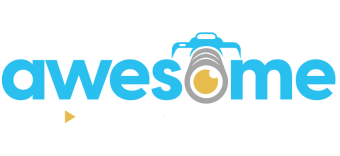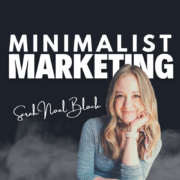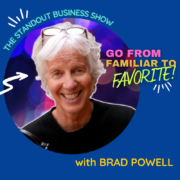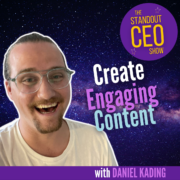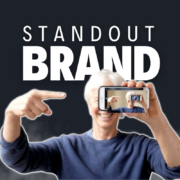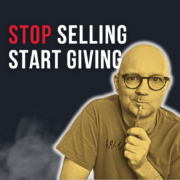137. The Secret to Minimalist Marketing with Sarah Noel Block
Imagine mastering your marketing so that you become the ONLY choice for your ideal customers so they’re choosing you over your biggest competitors!
“But,” you say in protest, “I have a small business with a tiny (or nonexistent) marketing department. How do I compete with the bigger brands without a gigantic marketing budget or a huge team?”
Well, I’d like you to meet this week’s guest, Sarah Noel Block, MS, founder of The Tiny Marketing agency, who’s sharing her secrets to creating big impact marketing with less time and money…
and presenting strategies that are exactly the right-size fit for your small business!
Want to see how you can stand out in a big way, even if you have a tiny marketing team?
Then listen up!!
Takeaways:
- Sarah’s “one by four” strategy that hones in on the perfect customer, channel, content, and outreach method to streamline your marketing and magnify your impact.
- How small businesses can punch above their weight by focusing on meaningful engagement over volume.
- How Sarah turned a live stream show into a bustling network hub.
Resources:
Connect with with Sarah Block:
https://sarahnoelblock.com/standout
Sarah’s Tiny Marketing podcast
Join the FREE Authenticity Code Masterclass
Transcript
Sarah Noel Block:
Because we’re all hearing this advice just do it. We are just doing it and we’re doing it everywhere. We’re marketing the way we see competitors or the big guys market, even if we’re a small business or just have a tiny marketing department, and it becomes overwhelming and you end up treading water on every channel in every category, because you’re trying to do it all and you really don’t need to. You need to first sell it, sell the thing to a few people and get their feedback so you can understand how they found you. How did they discover you existed? What challenges were they going through? What did their transformation look like? And then you can build your marketing around that.
Brad Powell:
Welcome to the standout business show, where it’s all about making a bigger difference by doing business differently. I’m Brad Powell. Today, we’re talking about the secret to minimalist marketing. One of the truths for practically everyone that I know who started their own business is that you probably didn’t start your business because you loved to do marketing. And if your business is kind of small, either you just work for yourself or you have this small group of people that you’re working with. How can you compete with the giant, big ones who have a huge budget and a huge team to make their budget be executed?
Brad Powell:
So I’d like you to meet today’s guest, sarah Block. She’s the founder of her tiny marketing agency and she’s going to join us today. Talk about her secrets to creating a bigger impact with your marketing with less time and less money and with strategies that are exactly the right size fit for your small business. So if you want to see how you can stand out in a big way, even if you have a tiny team, then stay tuned and with that, let’s start the show. All right, sarah, welcome to the show.
Sarah Noel Block:
Hey, thanks for having me.
Brad Powell:
Let’s start by taking a look at the landscape of the small business world and this challenge that they’re all facing with how do they do their marketing? How do they get this job done? And people have a very sort of misfit idea of what marketing actually is and what they should be focusing on. So what do you see as the biggest challenges that the people who you work are facing?
Sarah Noel Block:
We’re always told to just get started. We have this need to research and blah, blah, blah, blah blah, but we’re using that as a way to procrastinate and not do the thing that we’re meant to be doing. But because we’re all hearing this advice, just do it. We are just doing it and we’re doing it everywhere. We’re marketing the way we see competitors or the big guys market, even if we’re a small business or just have a tiny marketing department, and it becomes overwhelming and you end up treading water on every channel in every category, because you’re trying to do it all and you really don’t need to. You need to first sell it. Sell the thing to a few people and get their feedback so you can understand how they found you. How did they discover you existed, what challenges were they going through, what did their transformation look like? And then you can build your marketing around that. So first sell the thing before you start marketing.
Brad Powell:
Yeah, that really resonates with me. I mean, there’s something that Seth Godin says related to this, which is you don’t need a giant audience. You really don’t need to be along the lines of, say, what Gary Vaynerchuk suggests, where you’re on all the platforms and you’re churning out a lot of content and you’re sort of showing up everywhere all the time, as often as you can. Much more to the point is, if you have something that people want and you can find out like, well, what do people want, that I could actually do something, do some help with you, put that together and you get this small group of people, like five of them, who say, yes, I want it, and they buy it and they use it and they like it. Well, they’ll tell their friends, you know, and then they’ll bring their friends to whatever it is that you’re up to, and then you’re kind of done like that can build on itself. And this is to me it’s almost the inverse of the way most people think about what they need to be doing to sell their product.
Sarah Noel Block:
Yeah, you will find people who like in general I talk to a lot of business owners and the first year of your business you have a ton of people that want to support you and they’re willing to put their money on the line to support you and see you grow.
Sarah Noel Block:
That dies out over time. People are not so willing to put their money on the line to have you tested out, but that first year they are and you can use those as case study clients, discover who it is that you have helped the most and what it looked like, and then you can build your marketing around that. I have a hard one by four strategy that I do with marketing, where I’m not doing all the things, I’m just doing what matters and sticking to that. You only need to be on one channel. You only need one core content or visibility piece of the pie of marketing in an outrage strategy with one target customer. As you start doing these case study clients at the beginning of your business, you’ll discover who you help the best and you’ll have that ideal target customer that you know you can transform them to their best version and then, once you start speaking to them and building your marketing just around their challenges and what transformation they want. You’re going to see that selling gets so much easier and your content will sell for you.
Brad Powell:
Yeah, I like that. Okay, so let me just review that. So it’s one by four. It’s the first element. The thing that I am offering Is that one offer, Is that part of the one by four?
Sarah Noel Block:
One target customer. Okay, one core channel, one core content and one core outreach strategy. How are you getting new people in your sales pipeline? It doesn’t have to be more complicated than that.
Brad Powell:
Yeah, that’s great. I mean, first of all, being able to focus. I think in the world of the internet and the world of social media, there’s this promise, this elusive promise that, oh, now we’re connected to the entire world, the world is our oyster. We can reach anyone anywhere all over the planet. This is great and, of course, the problem with that is anyone anywhere is too broad.
Sarah Noel Block:
It really is. It doesn’t help at all when you’re trying to serve everyone and solve all the problems and you mentioned is one core offer part of it, and that makes it a lot easier. If you’ve one target customer with one core offer. That makes it so much easier because you’ll know exactly what to say, what challenges you’re solving and you can really optimize your processes around that offer. So it’s the most profitable that it can be. But what people are missing is the relationship aspect. So, yes, you are connected to everyone in the world Thank you internet but so is everyone else. They’re burned out and they don’t want they don’t want to hear your content. They don’t want it thrown at their face. They want relationships and they want to curate the content that they see based off of their own challenges. Because innately we’re all selfish. We all just want to know about us and what would help us.
Brad Powell:
Yeah, right, okay. So when you apply that to your outreach strategy and the content of what your message is going to be, what you’re talking about, when you’re sharing your ideas and your messaging and you’re focused on building that relationship, what are the strategies that you help coach people through in terms of well, I want to put this out, what are the things that I want to be talking about? Like, how do I line them up so that I’m creating, basically, kind of a narrative arc of here’s what you need to know in order to know that it will be good for us to work together?
Sarah Noel Block:
The first thing I do is a stakeholder call with internal stakeholders first, that our customer facing.
Sarah Noel Block:
So many times businesses are ignoring the customer service department, the sales department and just focusing on you know this is the marketing department or the product company or product department, but the customer service department and sales department they have such amazing insights that we’re missing out on because of the silos that we’ve created within our business.
Sarah Noel Block:
But if you can bring them all together in one conversation, you will actually uncover the entire buyer’s journey, that from the internal side. So customer service knows what the experience is like, what people are complaining about, what they wish was better, what problems they’re having. While the sales department, they have really great insights on what’s triggering people to buy, why did they raise their hand in the first place, what is it that they’re complaining about on these sales calls, what do they hope that they’ll see in the end and what goals are your customers having? By getting these parties together then you can get really amazing insights and more of a full view of what customers are experiencing from beginning to end and how you can replicate that. When you’re looking at, like most successful customers, you want to replicate that experience, right, so you can only do that by talking to those internal stakeholders.
Brad Powell:
That really resonates with me in the form of the customer service people and the sales people. They’re in direct contact, so they’re hearing all the questions, they’re running into all the objections and all of that material is makes for great messaging content.
Sarah Noel Block:
Really, really does.
Brad Powell:
You know it’s like what are people asking and what are they saying about, like what’s their headache and what’s their problem and what’s keeping them from getting the thing that they really want, that your business can help solve. And you take all of that and that’s your brilliant material for how to speak to them.
Sarah Noel Block:
That’s your messaging right there.
Sarah Noel Block:
And you mentioned objections. Objections are the best source for marketing. I always have FAQ pages or FAQ sections on sales pages. There are just a list of objections that my clients are hearing from customers, like the reasons people said no. So we can alleviate those objections before they ever happen, and this is the thing that helps shorten the sales cycle is addressing those objections before they ever become objections.
Sarah Noel Block:
And what I was going to mention before is, once I have the internal stakeholder interviews done, then I talk to your favorite customers, the ones that have just been beautiful and the experience was perfect, and then I need to know, like, how did they discover that you existed in the first place? My favorite question is when you have a problem that you’re going through, what’s the first thing you do, what’s the first step, and that right there will give us so much insight into, like, what medium your content should be in and what should your outreach strategy be. I’ve done this for so many clients and we’ve uncovered things that we never would have guessed. Like one of them, it would make sense for them to have an online course as a lead magnet, because that’s what their customers are doing.
Sarah Noel Block:
The first step they take when they’re trying to solve a problem is I want to learn, really condensed. I don’t want to have to Google everything, I want it all in one place. So they were requesting a digital course and well, another one was okay. I go to my referral network, I go to my trusted partners and I ask them what they would do. So in that situation, you need to come up with a way to build relationships with the people who would fall within that trusted circle. And there’s a way to do that. You just have to know what watering holes you need to be in in order to create that and manufacture that outreach strategy.
Brad Powell:
Yeah, I think that figuring out where your customer goes and hangs out to find out the stuff that they’re looking for and also just sort of what form they like to consume that information whether it’s an online course, or whether they go on YouTube and binge a bunch of videos, or whether they hang out on Instagram Everybody has their favorite spot and, given the kind of thing, the kind of problem that you’re solving, there’s different arenas. There is, yeah.
Sarah Noel Block:
And because you’re focusing on one target market, they’re likely really similar and how they solve their problems, where they spend their time online, what mediums they like, by having those customer interviews. I also do a customer survey that will tell us and whatever the majority is, that’s where we, that’s the medium that we focus on and that’s how we create our outreach strategy and generate leads, Because you know, marketing’s job is to support sales. Get more money in the door, that’s all I care about.
Brad Powell:
Right, let’s say we’ve done a fair amount of research. We have a pretty good idea of not only who our target audience is and what they’re up to and how they think and what their objections are, and on and on, and also where they like to hang out. What are the strategies for now? Starting to meet them where they are and do it in a very time efficient and money efficient manner?
Sarah Noel Block:
Yeah, when you’re first starting out, just focus on one channel and building your authority there. As an example, when I had decided I’m going to take tiny marketing full-time, it was a side hustle for a decade. I was a real chicken about going full-time with it. But when I finally made that decision that I was going to make tiny marketing its own thing, I went all in on LinkedIn and building my authority there. I tested out a lot of different kinds of content to see what resonated. That’s how I discovered what people cared most about was the strategies and systems I created as a one-person marketing department. I went all in on that and that’s how I came up with tiny marketing. But doing that testing out messaging strategies I like to call them like sound bites. Testing out those sound bites and seeing what resonates with people will help you and then build actual relationships.
Sarah Noel Block:
My goal is to take these conversations offline. I have a ton of connections and I actually know so many of them. Creating a way, a nurturing experience with your audience in order to build a real one-to-one relationship because I focus on service businesses you need to be trusted and you need to be liked and known. That’s the way to do it. Build out your authority on one channel and start reaching out to your people to have one-to-one connection calls. It’s not to sell, it’s to actually build relationships. A lot of the people in my LinkedIn network are my friends now and I talk to them regularly. It’s because of this that my goal is to build real relationships, not sell.
Brad Powell:
Yeah, I love that. I mean, that’s actually the only way to do it, as far as I can tell. I mean, there’s so many people on all the platforms, but LinkedIn included, where they’ll reach out to connect with you. If you say yes, they immediately try and sell you something. The page slap. Here’s my thing. Would you like to buy it or would you like to hire me?
Sarah Noel Block:
Yeah, I don’t trust you. No, then I delete you from my contact list. Right Exactly.
Brad Powell:
Yeah, it’s weird in the sense that I can’t imagine that way of operating actually works very well. They must be spending hours and hours doing this without much in the way of return. I just don’t see who responds positively to those that immediate like will you marry me even though you don’t even know me?
Sarah Noel Block:
Imagine doing that in person. You’re at a networking event and you walk up to someone Hi, I’m Sarah, this is my offer.
Brad Powell:
Will you buy Right?
Sarah Noel Block:
I would never.
Brad Powell:
Yeah, exactly Building Relation. I know that you have your own podcast. I know this because I was just a guest on your show.
Sarah Noel Block:
Yes, it’s being released on Sunday, all right.
Brad Powell:
Now, how do people find your show? Would you just plug it in?
Sarah Noel Block:
Yeah, it’s absolutely everywhere. It’s a tiny marketing show.
Brad Powell:
Okay.
Sarah Noel Block:
So anywhere you listen to podcasts and it’s also on YouTube.
Brad Powell:
All right, so stay tuned for the Sunday edition of the Tiny Marketing Podcast show, because I’m on it.
Sarah Noel Block:
Mm-hmm.
Brad Powell:
And so the thing, like with this kind of guest interview type of presentation, the big benefit, in fact, is really the main reason that I do it and I’m guessing that you do too is that you’re doing relationship building with everybody who you meet and it’s a huge bonus of putting out like this is content, but it’s really about networking and it’s really about who can you bring on who’s like super interesting, doing something really cool that you can actually learn from, like yes, I’m helping my audience learn things. Yeah, but guess what I get to learn the most because I’m the one who’s here every single time. I feel smarter.
Sarah Noel Block:
After I interview everybody, I’m like, oh my God, I just absorbed so much knowledge. But you’re totally right, and when I started my show, I started it in 2020 as a live stream show like this, and it was just a build relationships. It was just to meet people and I would interview people. I had marketing crushes on and I just wanted new. I just wanted business friends. That was my only goal.
Sarah Noel Block:
But then they turned into referral partners and most of my referrals come from people who have been on my show, which is just nice and wasn’t planned that we talked about outreach strategy and how to connect with people, and one of the best ways to get people to want to connect one on one with you is to offer them something. So if you’re, if you have a show, you’re able to offer them hey, I can spotlight you in the show, you can be the expert guest on the show. Or if you have a community, you can reach out to people that you want to connect with and say, hey, do you want to be an expert speaker and speak in my community? If there’s just having your content marketing platform, your core content is such a great way to build relationships too, if you do it right.
Brad Powell:
Yeah, and I kind of put in the context of it’s really good to have something that’s an easy yes that you can gift to people and say how would you like to come and be on my show, you know, be the special guest on upcoming episode. And most people will respond positively to that, almost no matter who they are and how big they are. And I know that I’ve definitely had some people on who I had a kind of marketing crush on, or they were just someone who I’d have been admiring for a long time, and now I get to meet and interview one of my heroes, which is terrific, you know it’s me Just joking.
Brad Powell:
Right, exactly. And so I want to move into another realm, which is that we’re networking. We’re meeting people, we’re interacting with them. What are the kinds of strategies you can put in place so that we’re not getting lost in the networking? I mean, for instance, when I go to a conference, an actual in person conference this, the opportunity, or even the temptation, is to run around and meet as many people as possible, and a friend of mine who teaches networking, she describes these people as the skunks who have their pile of business cards and they’re literally spraying their cards around the room as quickly as they can.
Sarah Noel Block:
That’s a good visual.
Brad Powell:
So we don’t want to do that. In fact, I have really tempered my attitude about going to a conference, which is I come to it thinking well, I’m very likely to meet one person who’s going to become a really good friend in the long term and if I come away from this conference having that happen, that makes this whole you know, this whole time here in a big success for me.
Sarah Noel Block:
That’s my only. Goal is to make friends.
Brad Powell:
Well, yeah, and usually that’s what happens, but it’s a small number like. It’s not anything like I need to meet this many people or some big quota of something. It’s well, I want to build a relationship with a very narrow group who’s exactly the right person, whether they’re somebody who could be a client or there’s somebody who could be a partner and collaborator in the future. Either one, they’re both terrific. So how do you counsel your clients in terms of putting a kind of focused, blinder thing on of of now, we’re going to do this type of networking and engagement, but we’re not going to go crazy in terms of the amount of time we put in the number of people that we talk to, etc. Etc.
Sarah Noel Block:
Yeah, so I try and do that within the messaging. If you’re owning the networking event or the outreach strategy, you have ownership of it. So you have ownership of the messaging and who it goes to. So I make sure the messaging is really on brand. So it’s. It makes it’s very clear who I’m talking to and who I want to reach and who I don’t. So having that attract and repel messaging in your copywriting is really important and keep in mind this is when you own the networking experience. And then the other thing is being really really intentional about who your target audience is and creating a community around that. So when I started creating my live workshops, the first thing I did was create a community on meetup so I’m able to define exactly who should be attending these workshops and meetup fills that community for me and I just have to post my events there. So it makes it really easy. So my number one piece of advice is just be super clear in your messaging on who you’re trying to reach when you’re when you’re owning it.
Brad Powell:
Yeah, I like that. So tell me more about the meetup stuff you’re doing, like how often do you do it and just what is that Like? I mean, I’ve done, I’ve gone to many meetups, I’ve done my own meetup for a while and it’s interesting from the point of view of some of them are really focused and really well attended. They’re definitely a type of watering hole and if you if that’s your wanting all it’s a really good place to go. Other ones seem almost random.
Sarah Noel Block:
There are because anyone can create a meetup group Right. So in my experience, I created one and then I put on events every six weeks, workshops for them, and it’s, you know, the people that I would want to buy, I would want to purchase my, my product and it’s also people that are local, because I really wanted to build more like in real life relationships, in-person relationships. So I wanted the opportunity to work with more people that were local, where now my clients are all over the country, all over the world actually.
Brad Powell:
Yeah, that’s cool. Well, now that we’re clearly in the clear of post-pandemic and we can meet up, yeah.
Brad Powell:
So, as anybody’s thinking about this, it’s a time to possibly put this kind of networking marketing strategy into practice. And it’s starting. Your own meetup is simple. You just go on to meetupcom and say, okay, I want to do this, but talk a little bit about your experience with hosting an event like that and the balance between being the workshop leader, presenter and actually making room and space for people to meet one another and network with each other.
Sarah Noel Block:
So for myself, I use it as a distribution channel for my workshops, because I’m not only just posting them there, I have them advertised on LinkedIn, I have them on my website, I have them on Eventbrite. I am doing guest appearances to promote my workshops. My goal is to get in front of as many of the right fit audiences I can for them and fill them. And then they’re interactive workshops, so there’s plenty of time to chat and there’s work time with music and timers. So we’re doing a lot of heavy work within the workshop, but then afterwards I provide a nurturing experience where there’s a community that they can interact with each other.
Sarah Noel Block:
So I think that’s the thing that a lot of people are missing is when you have this outreach strategy like an event, we’ll go with a virtual event and since that’s what I do, then if you’re selling a service, it’s very unlikely that people are going to buy right on the spot.
Sarah Noel Block:
You need to nurture that experience and create a community so that you can build trust and build that one-to-one relationship. So my advice would be, after you’re having that networking experience, then move them into the nurture experience where you connect with them one-on-one. You aim to just 15-minute talk once a quarter that should be your goal with them, and have a little parking lot, we’ll say, with a community, where they can watch some of your videos, they can interact with each other, ask questions, just have an available space to continue that relationship and that interaction. And I think that’s the way to go, because a lot of times you’ll meet people and then it’ll just fall off, that relationship dive. So you need to make sure that you’re maintaining that relationship. Those are my two steps. After an event or some sort of networking thing is, try to get on one-to-one calls at least once a quarter and create a community, a space where they’re consistently interacting with me.
Brad Powell:
Yeah, I like that All right. Well, that’s probably a really good note for us. To close on. We’re just at the end of our time today. If there is one inspiring thing you’d like to say for a small business person who’s feeling beleaguered because they feel like they have a lot of time and money to do their marketing, what would you like to say to them?
Sarah Noel Block:
Well, you’re not alone. You’re feeling burned out, and that’s reasonable, because you’ve been told that you have to do all of the things, but you don’t. You only need to have one, one outreach strategy that’s effective and go from there. Try my one by four marketing strategy. Just, you can implement it yourself. I even had an episode recently that describes exactly what you need to do, and you’ll find that you can get all of your marketing done in a really limited amount of time. I do the one by four strategy for myself and it takes me four hours a week and I have a podcast. You don’t have to have a podcast. That’s what takes up the majority of the time.
Brad Powell:
Yeah, all right. Well, if people want to hook up with you, I know we talked about your podcast, so go check out the Tiny Marketing Show podcast and you also have a lead magnet.
Sarah Noel Block:
Yes, you can go to serenualblockcom. Stand out, and I have one. You can attend the replay of the lead magnet workshop and you can also find my show there and get 50% off of your one by four marketing strategy.
Brad Powell:
Awesome, great. Ok, so that’s say it slowly serenualblockcom Slash, stand out. Yeah, that’ll get you there, all right. Well, sarah, thank you so much for coming on today. This has been great conversation.
Sarah Noel Block:
Thanks for having me.
Brad Powell:
Everyone is publishing content online, but very few are showing up authentically. So we created the Authenticity Code Masterclass to help you find the key missing ingredient to creating a compelling brand.
Sarah Noel Block:
So everybody has a way that they fascinate people, and the through line on all of this is really knowing yourself, your authenticity, your values, your strengths, and communicating that so that’s Eva Chen.
Brad Powell:
She’s a branding expert who spent the past 20 years working for Fortune 500 companies, and she is joining me in this masterclass.
Sarah Noel Block:
So branding is communication and perception. What do I offer that is making an impact, solving a problem? The personal branding part is kind of like peeling off of layers, because genius, everybody’s a genius. Genius that defined is really your natural intelligence that isn’t interfered with.
Brad Powell:
And most of the times we’ve gotten interference, and so that’s why the first step of finding a calling is Join us on Wednesday, january 17th, at 1 pm Eastern Time, 10 am Pacific Time, and learn how to bake what makes you unique into everything you offer, and discover how creating a more authentic brand makes marketing a whole lot easier.
